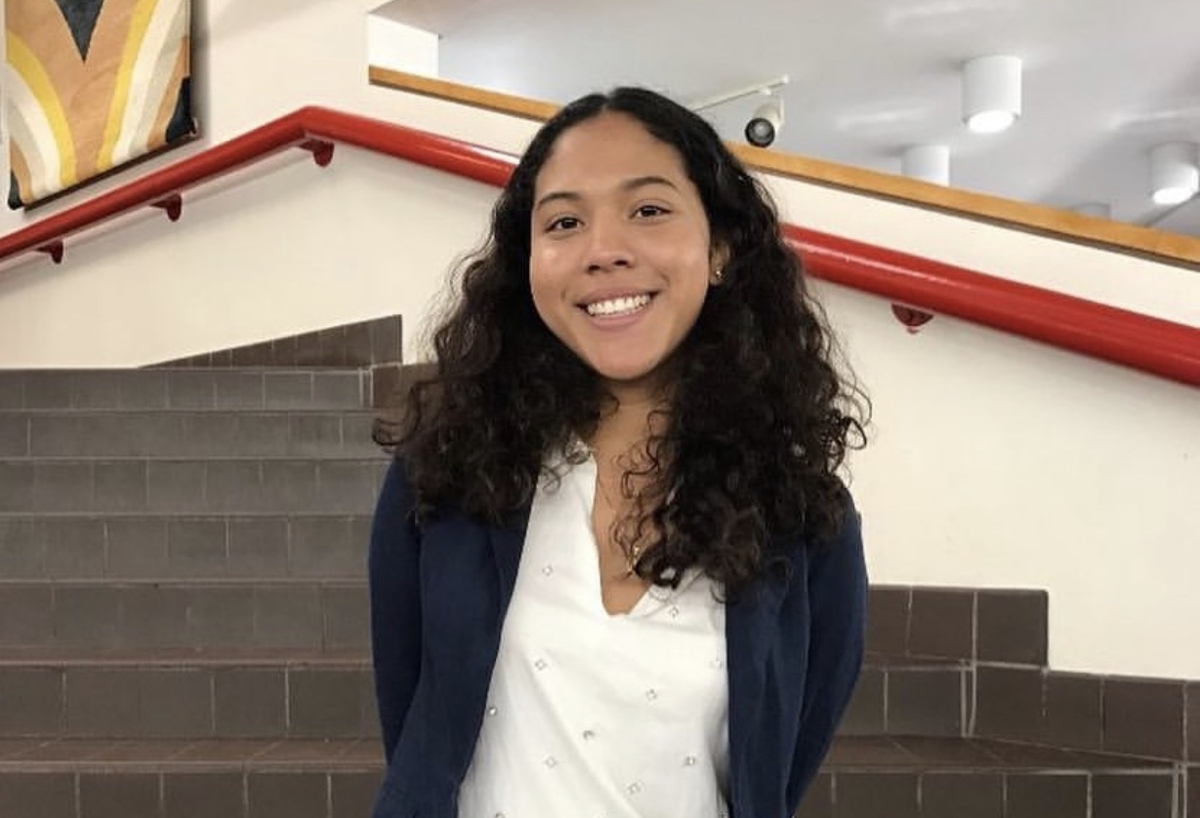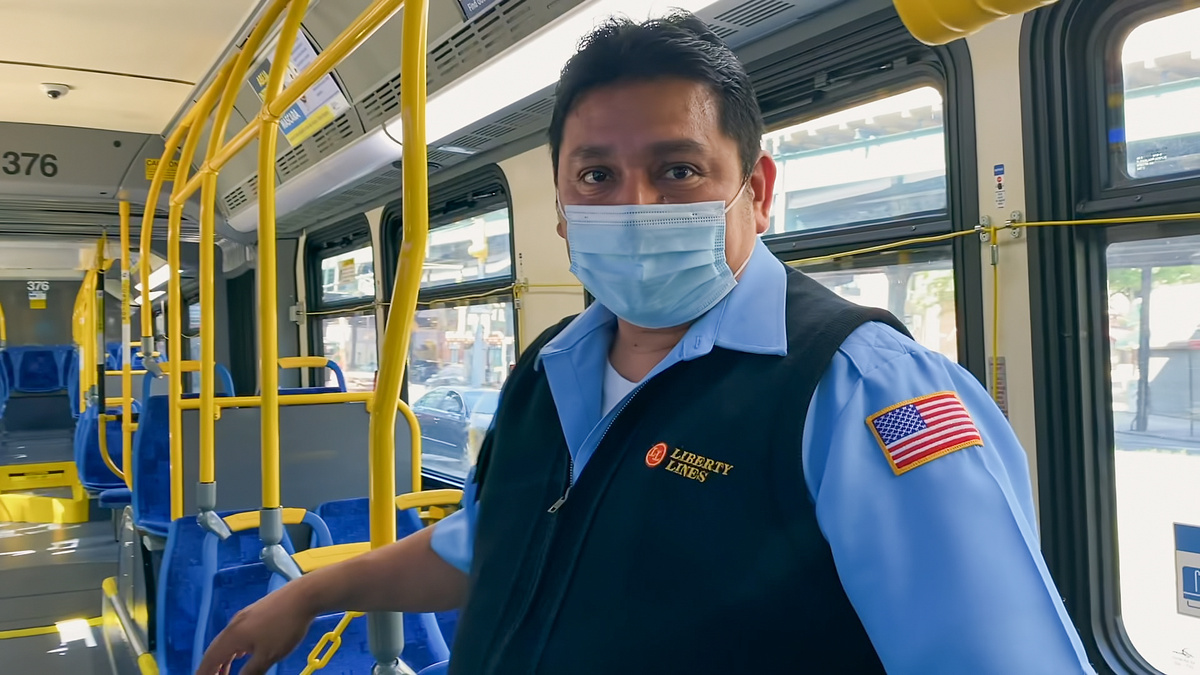
An omnibus project from the DCTV Youth Media Program, COVID Diaries NYC, which began airing March 9 on HBO, is exactly what its title implies—a cinematic journaling of sorts from five young New Yorkers (the team includes Marcial Pilataxi, Aracelie Colón, Camille Dianand, Shane Fleming and Arlet Guallpa, with original animation provided by Rosemary Colón-Martinez) forced to navigate the many landmines of budding adulthood during a once-in-a-century pandemic. Ranging in age from 17 to 21, and of varying backgrounds and ethnicities, the quintet all bravely place themselves and their equally struggling family members in front of the lens. Which ends up doing something surprisingly remarkable—shamefully exposing us viewers, and society at large, as well.
For the one thing this fivesome shares, besides a hard-hit city, is that they all hail from industrious, working-class families. We’re introduced to a mother who spends up to 24 hours a day as a home-care worker (but is paid for only 12), and a grandmother who busily sweeps floors and bags garbage as a building superintendent. Then there are the fathers who toil for the postal service, as a subway mechanic, a bus driver and a restaurant manager. In other words, COVID Diaries NYC is at its core a collective portrait of those we in America have suddenly deemed “essential” but have long considered disposable, seen through the eyes of those who love and depend on them. The folks that don’t have the luxury of staying safe at home for Zoom meetings (let alone for streaming HBO).
And crystallizing this capitalism-as-slavery concept is Arlet Guallpa’s ‘Frontline Family,’ one of the shorts in COVID Diaries NYC, in which the filmmaker spotlights herself and her (right-wing demonized) immigrant parents. Her mother is the aforementioned, financially exploited home-care attendant, her dad a sleep-deprived bus driver (shuttling quite a few self-centered riders who seem to think mask mandates don’t apply to them). Guallpa herself is both fiercely protective and abundantly proud of her mom and pop, who put their lives on the line every day—less for the collective good than simply to ensure food and shelter for their beloved daughter. Heroes for sure, but not of their own free will.
Which is why Documentary is truly honored to feature this promising young director, and thoughtful chronicler, as our March Doc Star of the Month.
DOCUMENTARY: Did your mentors at the DCTV Youth Media Program set out specific guidelines for the project? I suppose since the title is COVID Diaries NYC, you might have had to put yourself in front of the lens.
ARLET GUALLPA: Actually there really weren’t any guidelines. This was a spur-of-the-moment type of thing. I was in another program of theirs, and was ready to shoot another film, when COVID-19 hit. Since DCTV’s mission is to combine resources and give filmmakers a chance to tell their stories, they just gave out a couple of cameras, chose a couple of us to document our lives—just whatever we wanted to film when COVID first started. That was from April to August. I chose to document my family, we shared our stories, and HBO picked it up from there.
D: So what were some of the challenges, both logistically and emotionally, of placing not only yourself but also your parents in front of the camera during such a difficult time?
AG: There was a lot. I’m a very shy person, so to put my story out there took a lot out of me. And just witnessing everything at that time, because there were so many horrible things happening. People were dying, and everybody was in a state of panic. Seeing my parents having to face that was difficult for me.
It was scary in general, just following my parents on their everyday routine. I was even scared of me getting it. And also, I was losing my job—that was a difficult thing I had to deal with at that time as well. I’ve finished college, but right now I’m on unemployment. I sympathize with families who are living off of unemployment because it’s not sufficient, it’s not enough.
But I think it was necessary to follow them, so you can see what they go through. There were a lot of things I wanted to film, especially with my parents, just because I feel like their story is not really publicized. You really don’t see it. That’s why I thought it was important to give essential workers a face.

D: For me one of the most powerful scenes in the film was watching the mask-less masses climb onto the bus your dad drives. We hear you say, “The sign is very clear, but I guess selfish people can’t read,” before visually calling out the rule-breakers one by one. That voiceover, tinged with anger, perfectly contextualizes what we’re seeing. These riders are oblivious—not only to one another, but also to your “essential worker” father. Did you set out to make this point, about those on the frontlines being rendered invisible, or did the scene just unfold organically before your eyes?
AG: It kind of popped in the moment. I think that, in the beginning, essential workers were unwanted. I wanted to show these people—my dad, my mom—that they’re parents, they have a family. It’s why it’s important to take care of one another, to wear masks to keep them alive. That’s why I wanted to focus on them.
Even now, when I see people not wearing a mask, it’s insane to me. Because when you put your mask on you’re saving lives, you’re protecting one another. And if you don’t, it’s heartbreaking, honestly, because it is selfish to people who have underlying health conditions and their family. It’s very frustrating.
D: Sure, the stakes are life and death. Just bearing witness to all this must have been tough.
AG: After filming my parents, the whole experience was very rewarding, just because I got to see everything in a different light. By following them I could see the sacrifices they’ve made for me, and how blessed I am because of them. It hurt me because my dad; as a bus driver, he’s in a bus filled with so many people not always wearing masks. And my mom, she goes to homes, and sometimes they may not be the most sanitary. I can see the struggle, and I’m very grateful for them. It puts things in a different light, gives a different perspective.
At the time I was unemployed, so I was at home. I wasn’t going out every day like they were. When you’re actually there with them, and filming them, you see just how scary it really is. You could get COVID at any time, so I just noticed the sacrifice they made for me.
D: Another scene that broke my heart was the discussion with your parents at home, in which they make it abundantly clear that they are both willing to put their lives on the line to ensure you have a roof over your head, food to eat. That basic human rights in this country come at the cost of getting sick and dying is truly unconscionable. So do you see your doc in the realm of social activist filmmaking—and if so what actions do you hope audiences will take?
AG: I never really thought about it too much like that. I just think, This is my life. My parents, being Latino, status was drilled into us: We have to get a job, we have to work. My dad, he was an immigrant when he first came to this country. It’s hard for him to speak up and ask for things. It’s just really hard for us to do that. My dad, he’s afraid sometimes that he’s not communicating right, not being able to speak English so much. That’s a scary thing, and it’s just a hustle that Latinos go through. They need to do it; they have no other option. And it is frustrating.
So I guess, Yes, in a way, I did want to bring that out with this film. That was one of my goals, something I hoped people would take away. I did want to show essential workers, what keeps them going and how they cope—just to give them a space and to see how revealing they are. I think the film in general could start a conversation about that. And also, I wanted to choose the narrative of how people view Latinos— especially in the last Administration, saying they were lazy, they were thieves. But most of the people that come to this country like going to work, to work hard and feed their families. That was my goal, ultimately what I wanted to show people.
D: Do your parents see themselves as heroes? Do they even want to be seen that way?
AG: They do. Yeah, they do see themselves as that. But at the same time, they do what they do because they have to, in order for me to survive. To keep the lights on, that’s just what we have to do. But they understand that we all need bus drivers, we need home attendants. They understand that society needs them to keep on going as much as our families do.
D: So finally, how are you and your parents all doing? Did participating together in this filmmaking process change your relationships at all? What are your plans for the future?
AG: Well, my parents, they got COVID. They’re better now, but it was hard when they got COVID—both at the same time, too, and I couldn’t see them. It was really bad and really scary because my dad has diabetes, he has underlying health conditions. That was really scary. We thought it was maybe from his job. Most likely it was.
I’ve always appreciated my parents, but I’m just so proud of them now. I see them and I see how hard they work—and I’m so proud to be their daughter. With them having COVID, I realized we can all go at any time. I kind of took them for granted a little bit, and appreciate them so much more now—what they do and what they represent, just as human beings. I saw my mom at work—she loves her job, she really loves connecting with people and helping her patients. And my dad, he loves his job as well. He loves being a bus driver, and I’m just so proud of the people that they are. They are my biggest role models.
They’re the reason why I keep going, and why I want to continue to make films. I really want to change the narrative about us, to see if I can make a change for my people. I want to give Latinos a representation and a voice—though I’m really happy that I filmed the George Floyd protests as well, to show how much all minorities have had to endure for so long—because they have so much to say, have so many ideas. Also, there’s a lot of misconceptions in my community about vaccinations—which is why it’s so important to film and to educate our communities. Because no one else will.
Lauren Wissot is a film critic and journalist, filmmaker and programmer, and a contributing editor at both Filmmaker magazine and Documentary magazine. She's served as the director of programming at the Hot Springs Documentary Film Festival and the Santa Fe Independent Film Festival, and has written for Salon, Bitch, The Rumpus and Hammer to Nail.




